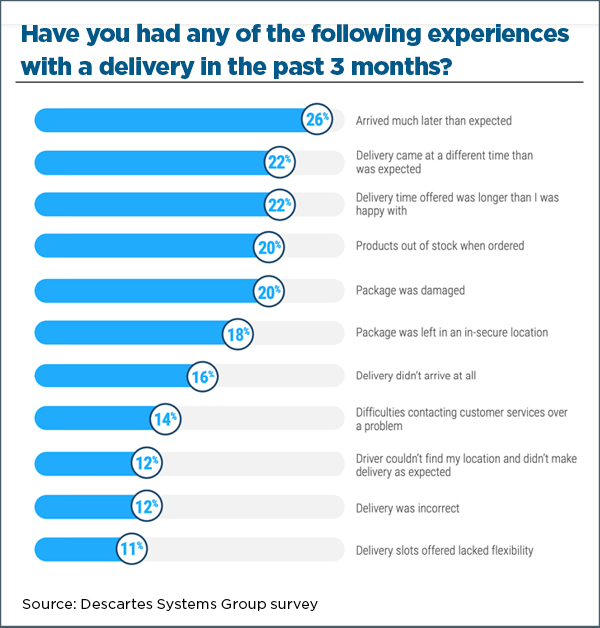E-Commerce: Delivering the Goods

A new study from Descartes Systems Group shows the ongoing e-commerce growth and the importance of delivery performance for customers.
After two years of aggressive growth due to the pandemic, e-commerce has become a purchasing method of choice across the globe. Fulfillment and delivery capabilities are key parts of the e-commerce experience, and consumer demands for what constitutes delivery satisfaction keep growing.
E-commerce retailers—and the carriers and last-mile delivery providers who serve them—face tremendous pressure to deliver orders on-time, damage-free, securely, and sustainably. That’s the gist of a new study from Descartes Systems Group, which surveyed 8,000 consumers across Europe and North America to examine consumer purchase and delivery preferences and concerns.
Six top-level findings from the survey illustrate the ongoing growth in e-commerce and highlight the importance of delivery performance in determining consumer satisfaction:
1. Online buying continues to grow. 48% of respondents will make more e-commerce purchases in the future, up 13% pre-pandemic.
2. It’s all about convenience. 54% of consumers cite convenience as a major reason for online purchases and deliveries. That’s even higher for those aged 55+ (64%).
3. Delivery is not satisfactory today. Three out of four consumers experienced delivery problems in the past three months (see chart). Key complaints include:
- Delivery arrived much later than expected: 26%
- Delivery came at a different time than expected: 22%
- Delivery time offered was longer than the consumer was happy with: 22%
- Package was damaged: 20%
- Package was left in an insecure location: 18%
- Delivery didn’t arrive at all: 16%
4. Poor delivery damages consumers’ perceptions. 23% of consumers have not ordered from the retailer again, 21% lost trust in the retailer, and 16% told friends and families to avoid the retailer, due to a poor delivery experience.
5. Customer expectations vary. Security (32%), proof of delivery (30%), and tracking (27%) are all more important for the most expensive items; cost of delivery (23%) is more important for lower-cost goods.
6. Environmental concerns influence buyer behavior. 85% of those aged 18-24, and 75% of 25 to 34-year-olds, consider the environment when placing an order.
